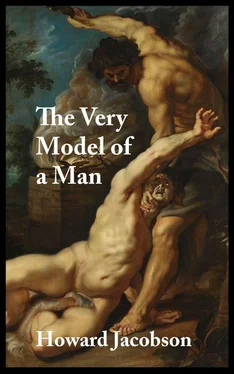Call yourself a murderer!
You have forgone your fearsomeness, Cain. Your iniquity doesn’t shock them any more. Your naked greed doesn’t shock them any more. A word from the wise: your naked arse wouldn’t shock them any more!
So what am I asking you to do? Oh, why are you always bothering me with questions? Just this: show them out of what terrible disharmony of soul Edenites like you and I achieve our final unity. Make them choke on our sins. Make them vomit on our farts. After all…
… THEY ALREADY DO.
I enclose a number of my recent pieces which may, or may not, interest you. Please return any not.
Fratricidally,
(No, I don’t mean, fraternally,)
Preplen, poet
In reply to that unctuous fiction, as in reply to Korah’s previous offensives against the Word (we speak softly in order to spare Sisobk), Moses could not muster the eloquence that a modern might.
Chronology and culture were against him.
Even in the desert, when you would have expected travelling light to be their first consideration, the bedouin Israelites trusted too much in the material proof of God’s election for Moses to be able to sway them against riches. Or against the falsehoods which of necessity issue from a rich man’s mouth.
At best, he might have got away with,
Hear me, O Israel, the rich man is wise in his own conceit
or,
Let not the wise man glory in his wisdom, neither let the rich man glory in his wealth
— these being only perfunctory musings on vanity in general, and not any particular singling out of wealth for censure.
As for,
Go to now, ye rich men, weep and howl for your miseries that shall come upon you… Your gold and silver is cankered; and the rust of them shall be a witness against you, and shall eat your flesh as it were fire
— no such dehortation against materialism was conceivable, because no such passion against it existed. It would be some while yet before men attached a higher value to what was absent from their eyes than what was present; and if the word for that is spirituality, it must not be forgotten that the spirit is what is sought at the end of a national dream, not at its beginning. With everything before it and a promise of spectacular conquest and well-being to realise — houses full of all good things, which it filled not; vineyards and olive trees, which it planted not — Israel was hardly in the temper to dissociate plenty from holiness.
Despair drives men to believe that riches and salvation are incompatible; and so, sometimes, does repletion. But seldom hope; and never hope in its infancy.
So Korah was safe, in the thirteenth century before Christ, from the charge of champagne insurrectionism. His three hundred mules count against him only in the modern mind. But there was another accusation, quite apart from his possessions, that Moses could have levelled at him. He could have expressed surprise, ecclesiastic to ecclesiastic, at Korah’s naïvety. ‘How little you appear to have grasped, Korah,’ he might have said, ‘of the real significance of those rituals and commandments which, in truth, any fool can parody.’
Had Moses been an early Freud — as Freud surely was, for the purposes of another sort of Jewish deliverance, a later Moses — he would have wasted no time explaining to Korah what Korah, as a member of a priestly family, ought strictly speaking to have known for himself, namely…
‘… namely, that the elaboration of those Mosaic edicts at which you scoff, Korah, serve the function of satisfying a guilt which is inevitable when a people make the journey from sorcery and magic — Zauberei and Magie — to a Monotheistische religion, and thus, by worshipping a father, duplicate communally the individual experience of family.
‘Having made religion personal, a matter of covenants and reciprocities, and therefore (you’re a family man, you know) treacheries and betrayals, you Israelites — you children of Israel — can justify God’s lapses of love and attention only by blaming yourselves; suppressing your hostility or disappointment in a ritualised performance of duties obsessional in character — Zwangsneurose… verstehen? — which serves at one and the same time the surreptitious ends of self-aggrandisement and self-abasement. In short, masochism. The voluptuous expectation of unpleasure. Literally the prevention, the forestalling of catastrophe by anticipation of its terrors, and by an acceptance, before the event, that whatever befalls you, you have brought upon yourselves.
‘I suggest that you consider your baldness in this light, Korah. Recalling — if you have the courage — everything you felt when you swung helpless as a baby in Moses’s paternal arms, and allowed him to take a blade to your genitals.
‘Thus, to return to the matter in hand, by setting yourselves ethical standards more and more impossible to observe, and on account of whose non-observance God-your-father has no alternative but to chastise you, the self-proving logic by which you understand yourselves to be chosen is assured. What your enemy/father Moses is effecting every time he returns from the mountain with another adjunct to the Torah, is nothing less than the perpetuation of your people’s faith. Only bind them in this complex of convenance and rupture, of arrogance and guilt, and no disaster can ever shake them. The more terrible their fate, the more conclusive the evidence of their election.
‘Nicht wahr, Korah?’
This was the process — still wet from the mould, still at an early and precarious stage of evolution — into which Korah, fired by individual rather than national ambitions, and excluded by his too-great wealth from the devious pleasures of asceticism, blundered.
And this was why Moses, who on many another occasion had pleaded with God for the life of a sinner, this time made it a condition of his and the Torah’s veracity that the gainsayers should not die the common death of all men, but should perish in a manner that would prove once and for all who was speaking through whom.
It wasn’t just punishment he was after. In order to strike a rebellion of this magnitude at its heart, Moses requisitioned spectacle. And went so far as to specify the precise spectacle which alone seemed to him commensurate with the danger his people faced:
Let God do what God had never done before, he said. Let Him make a NEW THING. Let Him cause the earth to open and swallow up the wicked men and all that appertain to them. Let them go down quickly into the pit. Into Gehenna itself. Let the earth’s crust close over them. And then let them say that Moses and his Torah are false!
Show them, LORD, that who provoketh me, provoketh THEE.
Even as requests to God go, this was a big one.
The God of Moses may have pulled a trick or two in Egypt, but essentially he disapproved of magic. He was not disposed to unlock the earth on the say-so of a prophet.
One of the explanations for the Jewish imagination never being much stimulated by the idea of a subterranean hell — another, of course, has to do with the adequacy of its experience of horrors above ground — is Yahweh’s cosmic scrupulousness, His reluctance to confuse morality with geology. Too random a policy of open sesame, too much rattling of the gates of heaven and hell whenever the issue of reward or punishment arose, and He would have been as liable to the charge of cultic backsliding as those recidivists among His chosen people whose feet tapped the moment there was mention of a golden calf.
An eschatology rooted in a palpable terrain invariably led back to animism and the legions of warring gods of agriculture. The future He had mapped out for the Israelites lay in a spiritual indifference to topography, a virtual disregard for the visible face of nature, let alone her rumoured cellars and underpasses.
Читать дальше











